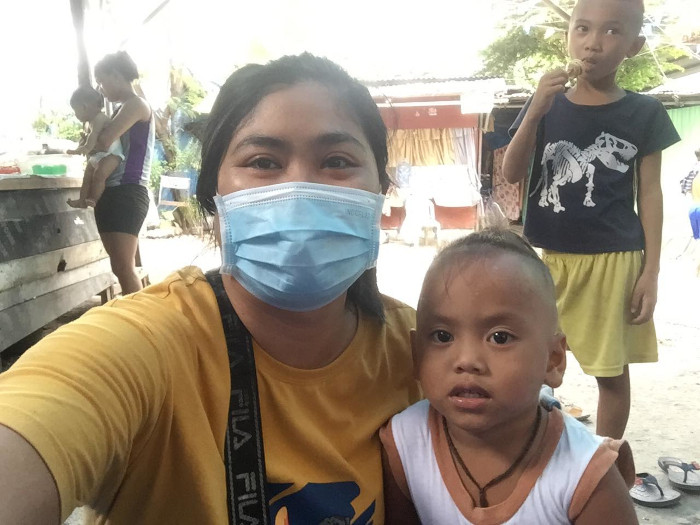“Now I Don’t Judge People Right Away”
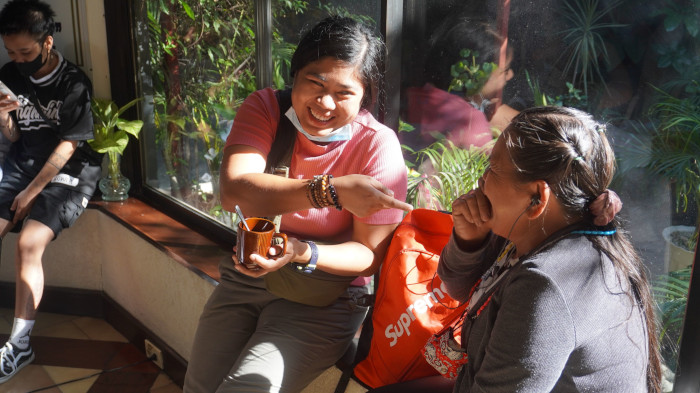
Photo: Fab Fabros shares a laugh with an ATD Fourth World member at Manila Planning Day
“Why am I here?”
“Why am I even here?” “Am I making a difference?” These are questions Fab Fabros, an ATD Volunteer Corps member in the Philippines, asks herself often. “Sometimes I feel so powerless,” she said in a recent interview.
Fab works in Manila where many impoverished families live in the city’s vast North Cemetery. Others live in an area called Paco where families survive in tiny shacks built with whatever they can find. “It’s very cramped,” Fab says. “They are separated only by one piece of wood.” Electricity is spotty and about 70 families get water from a few shared public faucets.
Yet these families are fortunate, says Fab. They used to live under a bridge, which was far more dangerous.
Some North Cemetery and Paco residents work in construction or restaurants, but still can’t afford rent elsewhere. Others risk their lives every day to earn money. Sometimes they stand in the middle of Manila’s chaotic traffic, trying to sell a few cigarettes or some candy just to buy their day’s meal. “It’s really dangerous,” says Fab of these roads. “There’s not much space to walk.”
A flower stand destroyed
But it’s not only the physical suffering that touches Fab’s heart. What really bothers her is how others treat people in poverty as if they were nothing.
Fab tells a story of a woman who sold flowers at a little stand in the North Cemetery. Families living there often face demolitions or clearing operations and last year it happened again. All the woman’s possessions were confiscated and destroyed.
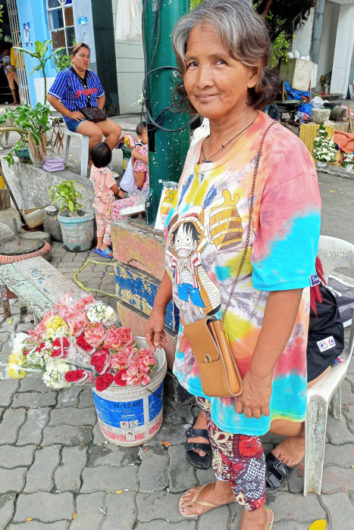
“They’re doing their best to survive,” Fab protests. “They’re trying their best to overcome poverty, to have a decent job. They need support.”
Positivity
Despite a miserable existence, the families she works with have what Fab calls “positivity.” “They are very generous,” she says. “They don’t have anything but they still give.” To illustrate this, Fab tells a story. One day, a woman’s house burned down.
- “Instantly, the facilitators [people in poverty involved with ATD] asked for contributions for things they could give her. Sometimes you think – these people, they don’t have enough money for themselves! But they are the ones who have this kind of heart: ‘I want to give something.’ We didn’t ask them to do this but they took the initiative to start collecting things and organize donations for this family. For me it’s so beautiful.”
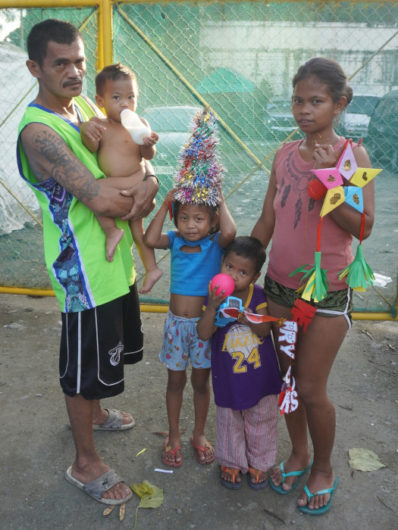
Fab is also impressed that people living such destitute lives don’t give up hope. “Even though they live in great poverty, they are still very positive. When they experience this kind of catastrophe, they can shift to think positively. They don’t feel sad or depressed; they think of how they can overcome this difficulty.”
Outraged, but powerless
Knowing how hard-working and generous these families are, Fab finds it especially hard to endure the way others see them. “I don’t know why these people are criticized or people think they don’t belong in society or they are doing bad things,” she states quietly. Fab is a very gentle person. However, remembering one incident, she becomes angry.
Another non-profit organization was helping people living in North Cemetery to get vaccinated against Covid. There was transportation to an area outside Manila where vaccines were available. Because Fab hadn’t gotten her vaccine yet, she went along with the community members.
Everyone was crowded into a jeepney, clutching their documents and permits that allowed them to re-enter the city. Suddenly, the jeepney was surrounded by armed police who wanted to know where “those people” were going.
We were just going out for a vaccine, nothing else!
“I was quite afraid for myself because I could see they were really interrogating people,” Fab recounts. “There were – I don’t know how many police! They were walking around the jeepney with guns. We were just going out for a vaccine, nothing else! But they were looking at us, accusing us as if it was something else. They were going around asking people, ‘Who are you? What is your job? Why are you here?’”
- “I was heartbroken by this,” Fab says sadly. “I’m not from this community, but I was so hurt by the way they treated them. It’s so hard for me to take this kind of thing.”
Inside, she was outraged. “It’s difficult to explain but I was really angry at the way they treated us. We are also human. It doesn’t mean just because they live in the cemetery that when they go out they will do bad things!”
Asked if this seemed like discrimination, Fab nods her head vigorously. “It’s like you are a criminal or something just because you look poor,” she affirms.
Sadly, some people in the jeepney were so intimidated by the police that they turned back to the city and never got a vaccine. “I was shocked,” Fab said. “They were really scared for themselves.”
Although seeing this was deeply disturbing for her, Fab felt powerless to stop it at the time. “If I had interfered, I might cause trouble for these people, so I told myself I will just stay quiet. But I was so angry because I was just sitting there waiting, listening.” For Fab who wants to help people and make a difference, this experience was devastating.
Meeting ATD
Fab grew up on a beautiful island called Talim. After working nine years with a pharmaceutical company, she quit her job to do a year-long mission with a religious NGO in an impoverished area of Thailand.
In Bangkok, she met Claude and Patricia Heyberger, two ATD Volunteer Corps members who invited her to their home for dinner. There Fab met people from ATD Philippines who were visiting Thailand for an education seminar. Two of them lived in the Manila North Cemetery and Fab was very intrigued by what they had to say. Later she helped Claude and Patricia with some translations before returning home.
When the pandemic hit, the only ATD team member in Manila was a young Spanish woman named Jennifer. Alone in a foreign country under lockdown, Jennifer needed help. So Claude and Patricia suggested that Fab do a remote internship to support her. Fab began transcribing and translating stories from families in impoverished communities like North Cemetery. Again she was intrigued by what they said, although she didn’t always understand their full stories.
“Everyone goes to Fab”
Once things opened up and Fab could visit families in poverty, she began to understand more about these stories. In fact, many people ATD works with soon started coming to talk to Fab. Because she’s a patient sympathetic listener, people find it easy to open their hearts to her. “Everyone goes to Fab!” says a fellow Volunteer Corps member. Sometimes Fab found herself listening to their stories or troubles late into the night.
It’s clear Fab enjoys being with people who live in poverty. Asked what she likes about working with ATD, she replies,
- “We’re working in the community. I like to be with the people, to be friends with them. I like to know their stories.”
Fab is also involved in ATD projects such as the Sulong savings program and the Street Library. And she enjoys living close to the people she works with too. While Fab is involved in these projects, she points out that, “We are not giving things, like offering material help or money, but accompanying them by being with them.”
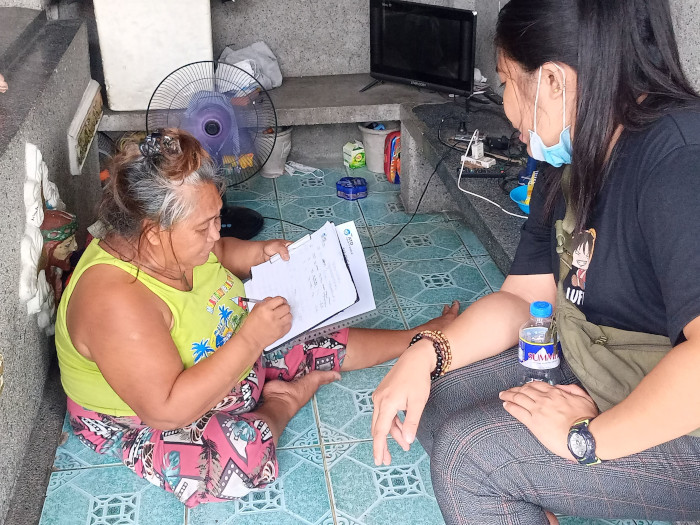
Although Fab enjoys what she does, it’s challenging when people ask her about her work. “It’s hard sometimes. People ask, ‘What are you really doing?’” And this worries her too. “Sometimes I don’t know if I really help people. Sometimes I’m confused. Am I really helping them or am I just there listening to them?”
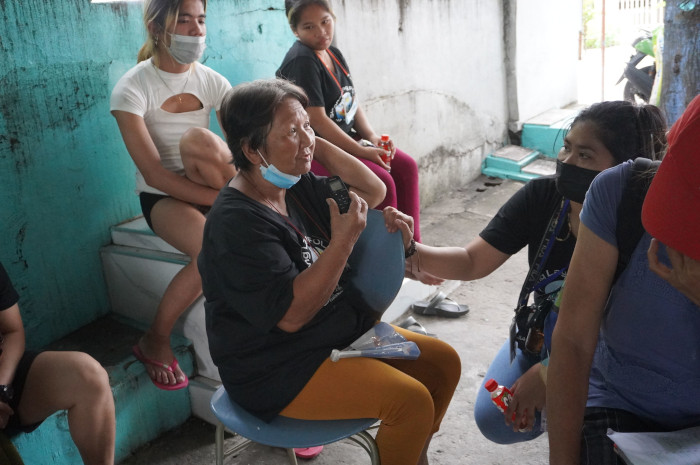
One of my favorite experiences
Despite this uncertainty, Fab brightens with enthusiasm when talking about the “Forum” project she worked on recently. “This was one of my favorite experiences,” she says.
The Forum is a gathering where people in poverty share their concerns and develop advocacy together. It’s not a free-for-all meeting, but an event carefully planned to help people express what they want in a productive way. It’s not always easy for people focused on day-to-day survival to reflect on the issues affecting them. “We would help them,” Fab says, “and encourage them to think more about things.”
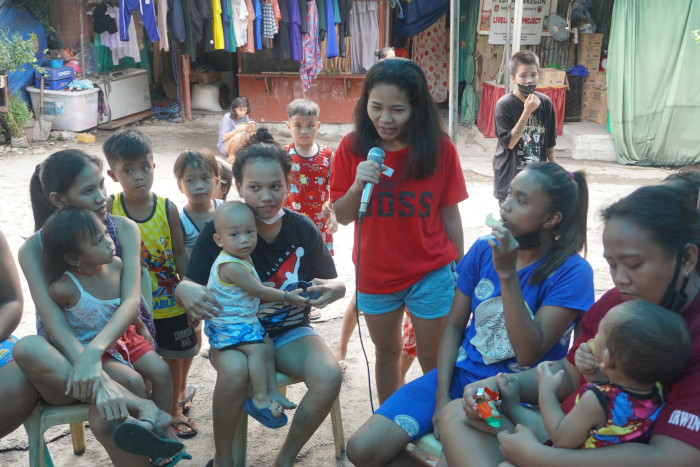
“I had no idea how to do this kind of Forum!” Fab exclaims. Nevertheless, she worked carefully with the facilitators leading discussions to think through their roles. She really pushed participants from a background of poverty to consider what they wanted to say and to examine the discussion topics thoroughly.
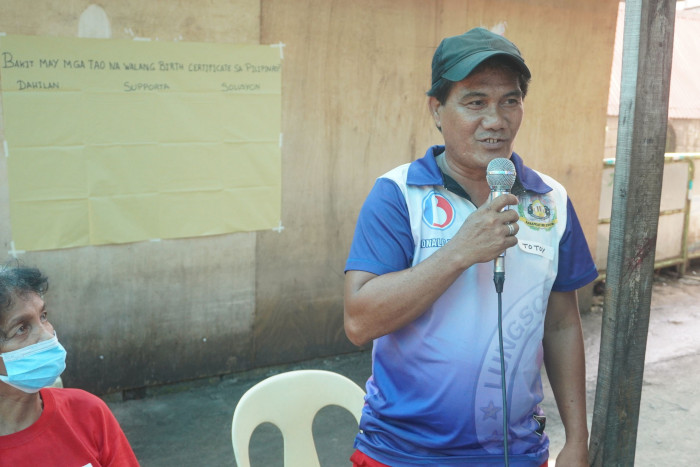
Lead a discussion
Of course, it’s intimidating for people to lead a discussion.
- “It was quite hard for them,” Fab remembers. “So we tried to build up their confidence. We said, ‘You can do it!’ They were nervous, but only in the beginning. After awhile, it came naturally and they did it very well. It was a very nice experience for me. I really salute them because they overcame these difficulties. For me, everything was perfect. It was very good; it was amazing!”
It’s clear that helping individual people to overcome their fears and succeed means a lot to Fab. “I was so happy,” she says, enthusiastically. “Even if it was tiring, I was happy! And I think I have more friends after doing that.” Soon after the Forum, she was thrilled that a new man who had been there joined another ATD project. “Even though it was a group of women, he still joined us. It was so nice!” she beams.
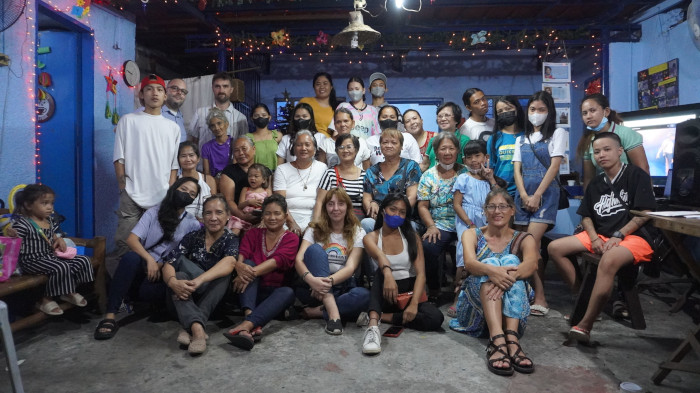
Being at their back
Fab loves this kind of thing – encouraging timid people as they dare to do challenging things. One new person joining a project fills her with hope and excitement. She knows this kind of encouragement is critical for people who have been beaten down by poverty, scorn, and maltreatment. Asked about her role in the Volunteer Corps, Fab says,
“I think the support is the thing we can really offer them. We give them confidence or courage because sometimes we cannot do everything for them. But we can really be at their backs to try to push them and tell them you are not alone. It’s really important.”
“It’s hard to explain”
While she has seen that encouragement and “being at people’s backs” is worthwhile, Fab adds that it’s still hard to explain to other people. “I’ve only ever seen ATD offer this kind of help. That’s why it’s kind of hard for other people to understand what ATD really does.”
It can be disheartening when other people look down on something you know is important. “It’s discouraging,” Fab admits. When asked what she’d like to see change in her country, Fab sighs as she responds, sounding a bit hopeless.
- “I would say how people are treated. There should be equality. There should be no discrimination, whether you are poor or rich. We really need that kind of change. But in our society, if you are poor, sorry for you. If you are rich, you can be influential and have the power to change things.”
“This is really a big problem.” Fab doesn’t sound hopeful. “I don’t know how we can change this. Maybe it will take time, years, but things should be fairer.”
“It changed my life”
Fab isn’t sure how long she will keep working with ATD. Sometimes she feels powerless, confused, and discouraged. And, like parents in any country, hers would be happier if she were a teacher or had another profession with a good salary. It’s hard to explain to people that she’s “just volunteering.” Regardless of what she decides, Fab says that ATD has changed her life.
- “What I learned from ATD is not to judge, but to try to understand [people in poverty]. Maybe there is something that happened in their past that explains their behavior.”
“So I think it changed my life, because now I don’t judge people right away,” Fab concludes. “It’s like putting oneself in someone else’s shoes.”
